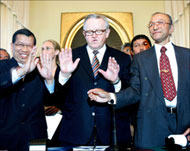Aceh victims criticise tribunal’s scope
Victims of Aceh’s civil war have expressed outrage that a human rights tribunal for the Indonesian province will not consider atrocities committed during three decades of fighting.

Government negotiators and rebel leaders, saying they did not want to open old wounds, argued that the court should only look at alleged violations that follow the signing of a peace agreement days ago in Finland.
“If we keep looking back to the past, we will continue to blame each other and there will be no end to it,” Indonesia’s Justice and Human Rights Minister Hamid Awaluddin said on Friday.
“There would be no peace in Aceh. So we decided to look forward.”
Mostly civilians killed
Almost all of the 15,000 killed in the 29-year war were civilians.
The military – and to a lesser extent Free Aceh Movement rebels, better known by their Indonesian acronym GAM – have been accused of extrajudicial killings, torture, kidnappings, rape and disappearances.
 |
|
A truce between warring sides |
Many of the alleged atrocities escaped the international spotlight.
Aceh, on Sumatra island’s northern tip, was closed to foreigners before the 26 December tsunami crashed into the province’s shorelines, sweeping villages to sea.
In the provincial capital, Banda Aceh, a civil servant said he was unhappy with the decision to create a tribunal that ignores past crimes.
He said that rebels kidnapped his cousin four years ago, never to be returned, and that Indonesian soldiers killed his uncle.
“The military accused my uncle of being a GAM member. They ripped open his stomach with a knife and dragged him on the ground for 20 metres,” the 35-year-old said, requesting anonymity.
Afraid
Despite the signing of the 15 August peace accord, he and many others are still afraid.
|
“The military accused my uncle of being a GAM member. They ripped open his stomach with a knife and dragged him on the ground for 20 metres” Unnamed civil servant |
“I wish I could see my uncle’s killer brought to court,” he said.
“He should be punished for what he did to my family.”
Human rights groups also said victims of the brutal conflict deserve justice.
“This is their right,” said Hendardi, the director of the Indonesian Legal Aid and Human Rights Association.
Like many Indonesians, he uses one name.
“The military and the rebels should both be held accountable.”
Disarmament
The peace agreement was signed after the rebels gave up their long-held demand for full independence and agreed to disarm.
In return, Jakarta offered rebels amnesty and said it would give the province a greater say in running its affairs through a special autonomy deal that gives them the right to choose their own government.
 |
|
Indonesia will withdraw more than |
Indonesia also promised to withdraw more than half of its 50,000 troops from Aceh under the eyes of more than 200 EU and Southeast Asian peace monitors.
Some people, including lawmakers in Jakarta, have expressed concern that the terms of the peace accord were reached without little outside consultation.
But victims said that’s the way it’s always been.
Firdaus, a 24-year-old resident of Lhoknga, 45km southwest of Banda Aceh, said government troops shot his father.
“We could not say anything then,” Firdaus said. “And we cannot say anything now.”